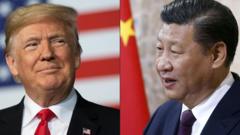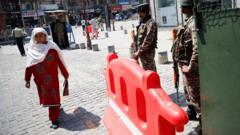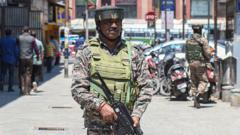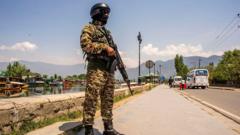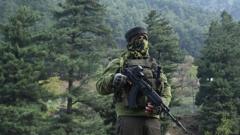In the wake of a terrorist incident in Kashmir, the U.S. and U.N. have heightened diplomatic talks to prevent escalation between India and Pakistan, emphasizing cooperation and the need for dialogue.
**U.S. and U.N. Push for Peaceful Resolutions Amid India-Pakistan Tensions**

**U.S. and U.N. Push for Peaceful Resolutions Amid India-Pakistan Tensions**
Efforts intensify to mitigate conflict risks between nuclear-armed nations following recent terrorist attacks in Kashmir.
In light of rising tensions after a recent terrorist attack in Kashmir, diplomatic efforts have taken center stage as the United States and United Nations seek to ward off potential conflict between India and Pakistan, both of which possess nuclear capabilities. Secretary of State Marco Rubio has been actively engaging with key leaders from both nations to foster dialogue and urge restraint.
On Wednesday, in his discussions with Prime Minister Shehbaz Sharif of Pakistan and Indian Foreign Minister S. Jaishankar, Rubio's tone varied, reflecting the delicate sensibilities surrounding the situation. With Jaishankar, Rubio emphasized the United States' steadfast commitment to aiding India in counter-terrorism measures. However, he also pressed for enhanced cooperative efforts with Pakistan to alleviate escalating tensions and ensure regional stability.
Conversely, Rubio adopted a more direct approach with Sharif, underscoring the importance of condemning the terrorist attack while also urging Pakistan to engage with India in seeking calm. Prior to their discussion, senior officials in Pakistan publicly denounced the attack and stressed that despite India alleging cross-border links, they had not been provided with compelling evidence implicating Pakistan.
The diplomatic discourse comes at a time when global unease about potential military confrontation between the two nations is palpable, as both sides navigate complex historical grievances and national security concerns. The U.S. continues to encourage a return to dialogue while advocating for measures to bolster peace initiatives in the volatile region.
On Wednesday, in his discussions with Prime Minister Shehbaz Sharif of Pakistan and Indian Foreign Minister S. Jaishankar, Rubio's tone varied, reflecting the delicate sensibilities surrounding the situation. With Jaishankar, Rubio emphasized the United States' steadfast commitment to aiding India in counter-terrorism measures. However, he also pressed for enhanced cooperative efforts with Pakistan to alleviate escalating tensions and ensure regional stability.
Conversely, Rubio adopted a more direct approach with Sharif, underscoring the importance of condemning the terrorist attack while also urging Pakistan to engage with India in seeking calm. Prior to their discussion, senior officials in Pakistan publicly denounced the attack and stressed that despite India alleging cross-border links, they had not been provided with compelling evidence implicating Pakistan.
The diplomatic discourse comes at a time when global unease about potential military confrontation between the two nations is palpable, as both sides navigate complex historical grievances and national security concerns. The U.S. continues to encourage a return to dialogue while advocating for measures to bolster peace initiatives in the volatile region.




